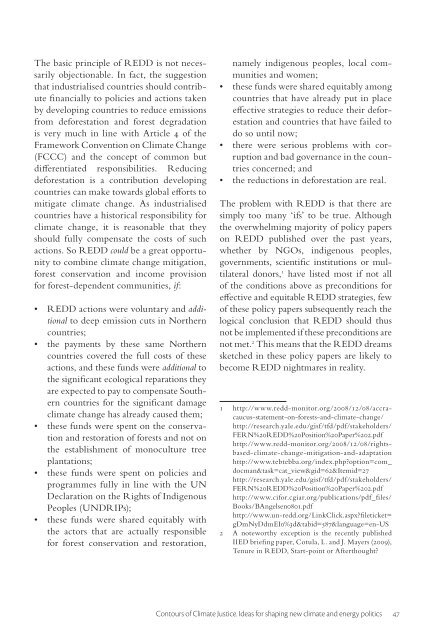Contours of Climate Justice - Dag Hammarskjöld Foundation
Contours of Climate Justice - Dag Hammarskjöld Foundation
Contours of Climate Justice - Dag Hammarskjöld Foundation
You also want an ePaper? Increase the reach of your titles
YUMPU automatically turns print PDFs into web optimized ePapers that Google loves.
The basic principle <strong>of</strong> REDD is not necessarily<br />
objectionable. In fact, the suggestion<br />
that industrialised countries should contribute<br />
fi nancially to policies and actions taken<br />
by developing countries to reduce emissions<br />
from deforestation and forest degradation<br />
is very much in line with Article 4 <strong>of</strong> the<br />
Framework Convention on <strong>Climate</strong> Change<br />
(FCCC) and the concept <strong>of</strong> common but<br />
diff erentiated responsibilities. Reducing<br />
deforestation is a contribution developing<br />
countries can make towards global eff orts to<br />
mitigate climate change. As industrialised<br />
countries have a historical responsibility for<br />
climate change, it is reasonable that they<br />
should fully compensate the costs <strong>of</strong> such<br />
actions. So REDD could be a great opportunity<br />
to combine climate change mitigation,<br />
forest conservation and income provision<br />
for forest-dependent communities, if:<br />
• REDD actions were voluntary and additional<br />
to deep emission cuts in Northern<br />
countries;<br />
•<br />
•<br />
•<br />
•<br />
the payments by these same Northern<br />
countries covered the full costs <strong>of</strong> these<br />
actions, and these funds were additional to<br />
the signifi cant ecological reparations they<br />
are expected to pay to compensate Southern<br />
countries for the signifi cant damage<br />
climate change has already caused them;<br />
these funds were spent on the conserva-<br />
tion and restoration <strong>of</strong> forests and not on<br />
the establishment <strong>of</strong> monoculture tree<br />
plantations;<br />
these funds were spent on policies and<br />
programmes fully in line with the UN<br />
Declaration on the Rights <strong>of</strong> Indigenous<br />
Peoples (UNDRIPs);<br />
these funds were shared equitably with<br />
the actors that are actually responsible<br />
for forest conservation and restoration,<br />
•<br />
•<br />
•<br />
namely indigenous peoples, local communities<br />
and women;<br />
these funds were shared equitably among<br />
countries that have already put in place<br />
eff ective strategies to reduce their deforestation<br />
and countries that have failed to<br />
do so until now;<br />
there were serious problems with cor-<br />
ruption and bad governance in the countries<br />
concerned; and<br />
the reductions in deforestation are real.<br />
The problem with REDD is that there are<br />
simply too many ‘ifs’ to be true. Although<br />
the overwhelming majority <strong>of</strong> policy papers<br />
on REDD published over the past years,<br />
whether by NGOs, indigenous peoples,<br />
governments, scientifi c institutions or multilateral<br />
donors, 1 have listed most if not all<br />
<strong>of</strong> the conditions above as preconditions for<br />
eff ective and equitable REDD strategies, few<br />
<strong>of</strong> these policy papers subsequently reach the<br />
logical conclusion that REDD should thus<br />
not be implemented if these preconditions are<br />
not met. 2 This means that the REDD dreams<br />
sketched in these policy papers are likely to<br />
become REDD nightmares in reality.<br />
1 http://www.redd-monitor.org/2008/12/08/accracaucus-statement-on-forests-and-climate-change/<br />
http://research.yale.edu/gisf/tfd/pdf/stakeholders/<br />
FERN%20REDD%20Position%20Paper%202.pdf<br />
http://www.redd-monitor.org/2008/12/08/rightsbased-climate-change-mitigation-and-adaptation<br />
http://www.tebtebba.org/index.php?option=com_<br />
docman&task=cat_view&gid=62&Itemid=27<br />
http://research.yale.edu/gisf/tfd/pdf/stakeholders/<br />
FERN%20REDD%20Position%20Paper%202.pdf<br />
http://www.cifor.cgiar.org/publications/pdf_fi les/<br />
Books/BAngelsen0801.pdf<br />
http://www.un-redd.org/LinkClick.aspx?fi leticket=<br />
gDmNyDdmEI0%3d&tabid=587&language=en-US<br />
2 A noteworthy exception is the recently published<br />
IIED briefi ng paper, Cotula, L. and J. Mayers (2009),<br />
Tenure in REDD, Start-point or Afterthought?<br />
<strong>Contours</strong> <strong>of</strong> <strong>Climate</strong> <strong>Justice</strong>. Ideas for shaping new climate and energy politics 47
















